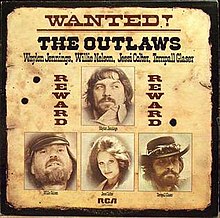Wanted! The Outlaws
| Wanted! The Outlaws | |||||
|---|---|---|---|---|---|
 |
|||||
| Compilation album by Waylon Jennings, Willie Nelson, Jessi Colter and Tompall Glaser | |||||
| Released | Original: January 12, 1976 Re-issued: February 15, 1996 |
||||
| Genre |
Country Outlaw country |
||||
| Length | Re-issue: 60:49 | ||||
| Label | RCA Victor | ||||
| Producer | Waylon Jennings Richie Albright Chet Atkins Danny Davis Tompall Glaser Ray Kennedy Willie Nelson Ray Pennington Shel Silverstein |
||||
| Waylon Jennings chronology | |||||
|
|||||
| Jessi Colter chronology | |||||
|
|||||
| Professional ratings | |
|---|---|
| Review scores | |
| Source | Rating |
| Allmusic |
|
Wanted! The Outlaws is compilation album featuring songs sung by Waylon Jennings, Willie Nelson, Jessi Colter, and Tompall Glaser, released in RCA Victor in 1976. The album consists entirely of previously released material. Released to capitalize on the new outlaw country movement, Wanted! The Outlaws earned its place in music history by becoming the first country album be platinum-certified, reaching sales of one million.
The album quickly reached #1 on the country charts and peaked at #10 on the pop charts, with two hit singles released, "Suspicious Minds" and "Good Hearted Woman." The two peaked at #2 and #1, respectively, both featuring Jennings. In 1984, this album was among the first to be issued on CD by RCA Records, with the catalog number PCD1-1321.
By 1973, Waylon Jennings and Willie Nelson had asserted creative control over their music, which they both felt had been hampered for years by the conservative approach taken to their recordings at RCA in Nashville. In 1972, Nelson left the label for Atlantic Records and recorded a pair of critically acclaimed albums, Shotgun Willie (1973) and the concept album Phases and Stages (1974). With Nelson becoming more popular, RCA did not want to lose Jennings as well, and granted him the authority to produce his records how he wanted. Jennings released the seminal Honky Tonk Heroes album in 1973, widely considered the first "outlaw" album, and This Time in 1974, which was recorded at Tompall Glaser's independent studio in Nashville. By 1975, after the explosive success of Nelson's Red Headed Stranger album, a whole new subgenre of country music had emerged called outlaw country. This new movement featured a more "progressive" sound and attitude, typified by the music of Waylon and Willie but also inspired by songwriters like Kris Kristofferson, Billy Joe Shaver, Mickey Newbury, Lee Clayton, David Allan Coe and Townes Van Zandt.
...
Wikipedia
